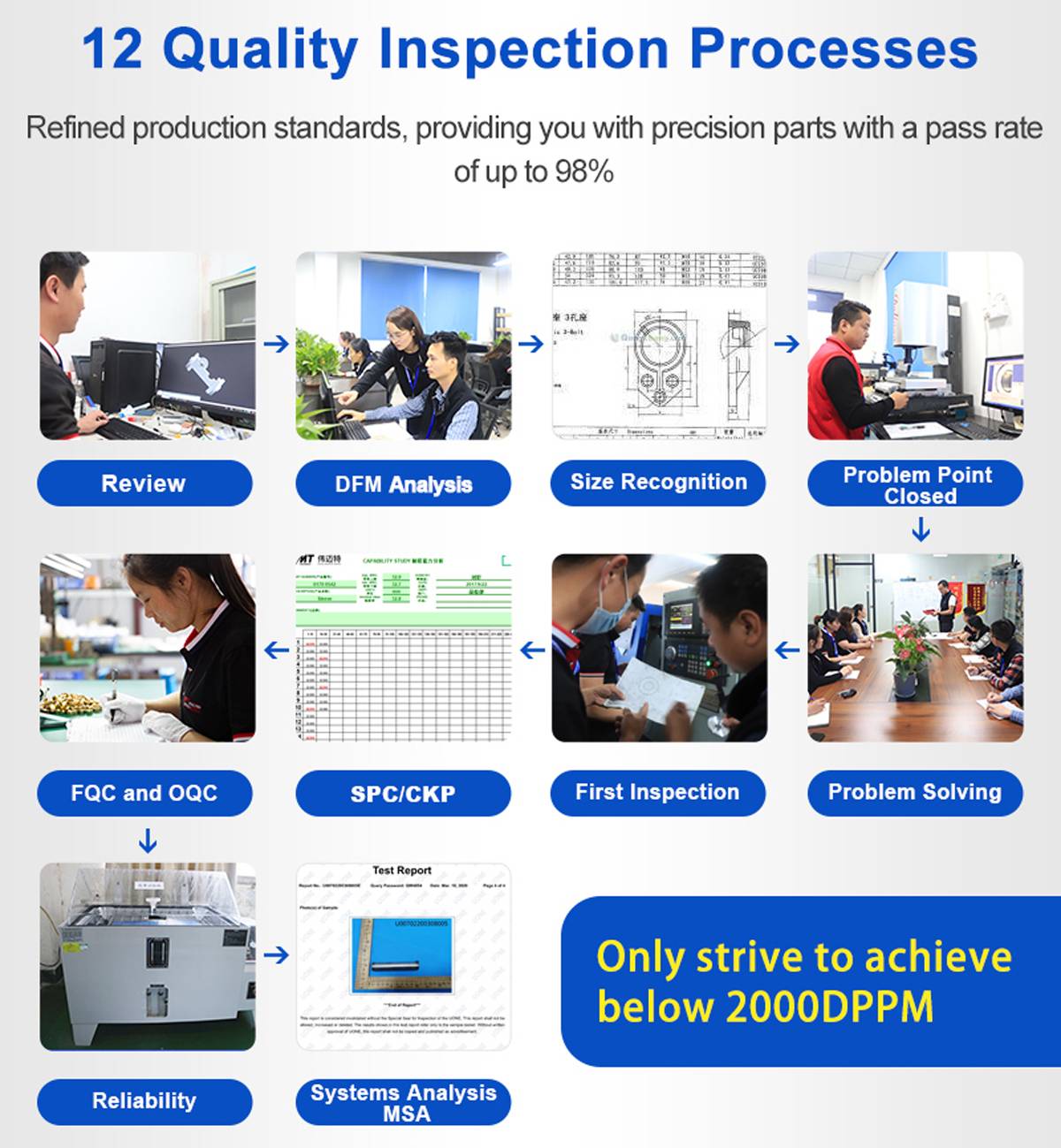15 years one-stop China custom CNC machining parts factory

Hey there I’m VMT Sam!
With 25 years of CNC machining experience we are committed to helping clients overcome 10000 complex part-processing challenges all to contribute to a better life through intelligent manufacturing. Contact us now
 124 |
Published by VMT at Mar 03 2024
124 |
Published by VMT at Mar 03 2024
The Relationship Between Lead Time and Quality in Custom CNC Machined Parts
In the realm of custom CNC machined parts manufacturing, there exists a close relationship between lead time and quality. This relationship not only affects the production efficiency and customer satisfaction of CNC machining factories but also directly influences the competitiveness and sustainable development of businesses. This article delves into the relationship between lead time and quality in custom CNC machined parts, exploring various aspects.

I. Lead Time and Quality: Complementary Relationship
In the manufacturing process of custom CNC machined parts, lead time and quality are two core elements. Lead time refers to the time from accepting an order to completing production and delivering the product to the customer, while quality refers to the product's characteristics, including compliance with design requirements, stable performance, and long lifespan. Although there may be conflicts between lead time and quality in certain situations, they more often have a complementary relationship.
Firstly, high-quality products tend to gain customer recognition and trust, attracting more orders and market share for the business. Stable production quality and processes help the factory better control the production schedule, ensuring the accuracy of lead times. Secondly, reasonable lead time arrangements allow businesses sufficient time for quality control and inspection, ensuring that product quality and performance meet customer requirements. Therefore, the relationship between lead time and quality is interdependent and mutually reinforcing.
II. Factors Influencing Lead Time and Quality
In the manufacturing process of custom CNC machined parts, several factors influence lead time and quality. Critical factors include the condition of equipment, technical expertise, raw material quality, and production process management. The condition of equipment directly impacts production efficiency and product quality, while technical expertise determines the precision and stability of product machining. Raw material quality is directly related to product performance and lifespan, and the effectiveness of production process management affects production efficiency and the stability of product quality.
Additionally, factors such as customer demands and order quantity, supply chain stability, and logistics efficiency also impact lead time and quality. Therefore, CNC machining factories need to consider these factors comprehensively, formulate reasonable production plans, and implement quality control measures to ensure a balance between lead time and quality.
III. How to Improve Lead Time While Ensuring Quality?
Improving lead time while ensuring the quality of custom CNC machined parts is a significant challenge faced by CNC machining factories. Here are some suggested measures:
Optimize Production Processes: Shorten production cycles and enhance production efficiency by improving manufacturing processes, increasing equipment utilization, and reducing production steps.
Strengthen Quality Control: Establish a robust quality management system to ensure strict quality control standards and inspection procedures at every stage. By improving the stability of product quality, delays due to quality issues can be minimized.
Plan Production Schedules Reasonably: Plan production schedules based on customer demands and order quantities, ensuring alignment with lead time requirements. Consider uncertainties in the production process, such as equipment failures or raw material supply issues, and develop corresponding contingency measures.
Upgrade Technical Expertise: Enhance the factory's technical expertise and machining capabilities by introducing advanced CNC machining equipment and technologies. This not only improves product quality but also helps shorten production cycles and increase production efficiency.
Strengthen Supply Chain Management: Establish long-term stable partnerships with suppliers to ensure the stable supply of raw materials and controlled quality. Additionally, optimize logistics distribution systems to improve logistics efficiency and reduce lead time delays caused by logistics issues.
IV. Case Analysis and Practice
Taking a CNC machining factory as an example, when facing challenges related to lead time and quality for custom CNC machined parts, the factory implemented the aforementioned measures. By optimizing production processes, strengthening quality control, planning production schedules reasonably, upgrading technical expertise, and enhancing supply chain management, the factory successfully improved lead time while ensuring product quality. This not only increased customer satisfaction and competitiveness but also laid a solid foundation for the factory's sustainable development.
V. Conclusion and Outlook
The relationship between lead time and quality in custom CNC machined parts is closely intertwined. CNC machining factories need to consider various influencing factors, formulate reasonable production plans, and implement quality control measures to ensure a balance between lead time and quality. In the future, as CNC machining technology continues to advance and market competition intensifies, CNC machining factories need to continually optimize production processes, upgrade technical expertise, and strengthen supply chain management to elevate lead time and quality levels. Additionally, staying attuned to customer demands and adapting production strategies to changing market conditions is crucial. Only by doing so can CNC machining factories stand strong in the fierce market competition and achieve sustainable development.
Ready To Start Your Next Project?
Get Instant Quote

Request a Free Quote
Send us a message if you have any questions or request a quote. We will get back to you ASAP!
